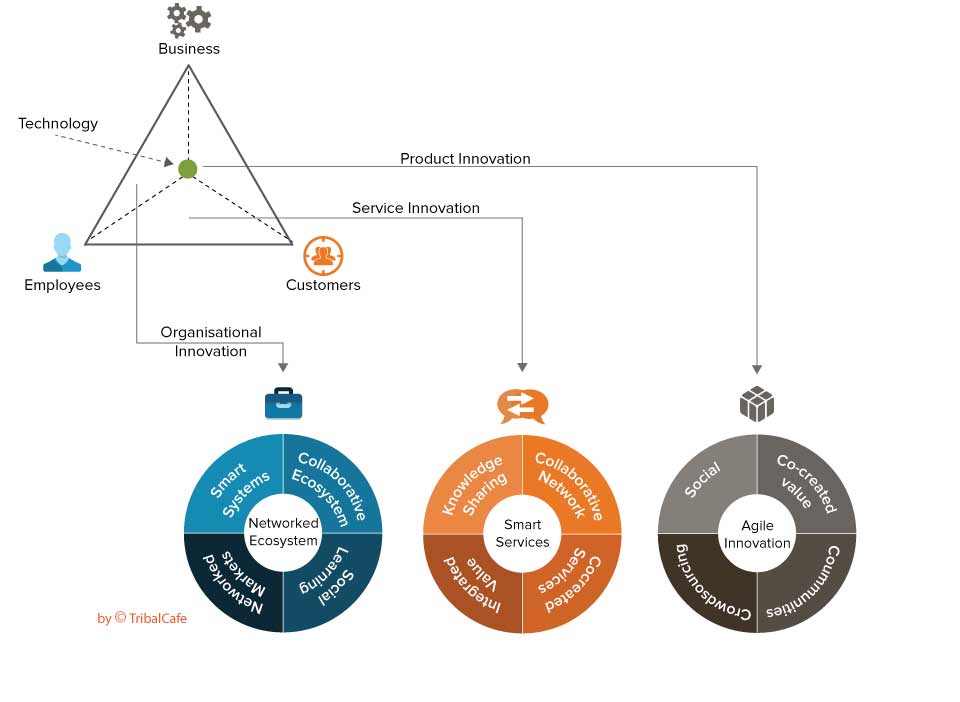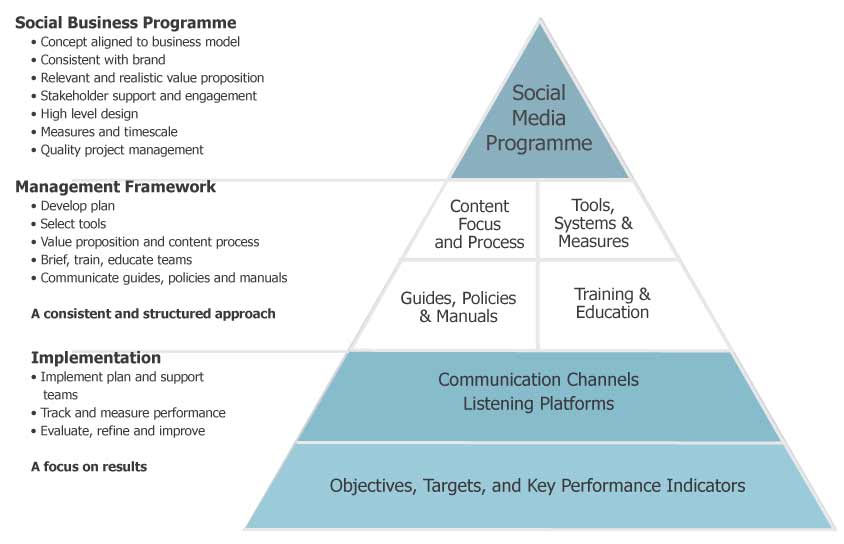Some may see that there is no need for a social media strategy definition. Surely it’s obvious what it is!
Recently the marriage of SEO and social media has dazzled marketers with the consequential rise in content marketing. As a result the opportunities to use social media more strategically have taken second place or been lost.
There are three compelling reasons for using social media:
- Marketing – understanding customers, developing brand awareness and fit to customer acquisition.
- Employee Engagement – developing company culture, improving internal collaboration and recruiting talent.
- Collaboration – creating social spaces to collaborate with partners, suppliers and customers.

Unifying how social media fits to the overall business strategy is crucial to build and grow a business. Social media plays an unusual role in that it fuses together the building of a brand internally and externally.
Internally it forms part of ‘the way we do business’, which in itself forms and establishes the culture of a business.
Externally, it is not only the outward communications mix but the reactions and opinions to that communication both good or bad: the conversations that determine brand reputation.
As a discipline, it crosses HR (recruitment), sales, marketing, customer service, supplier and partner relationships and sets the tone of the culture within the business.
What Is a Social Media Strategy?

A social media strategy is a plan of how to maximise engagement and interactions across social media to achieve a company’s objective. These objectives may be to generate leads, improve brand awareness or create a viral effect.
THE BUSINESS STRATEGY
The question “What is a strategy?” has ignited hours of debate amongst academics and management thinkers alike. This perhaps is a good indicator of why there is no one single definition of strategy and why businesses struggle with it.
Defining a social media strategy promises to be no less controversial.
- Goals – the aims of the business, its purpose and what it wants to achieve.
- Strategy – defines how you will achieve your goals: the plan.
- Objectives – are the specific details and accompanying measures (SMART)
- Tactics – tactics are specific actions.
I doubt if there is one definition of a social media strategy that everyone could agree with.
The goal of this blog is to get businesses to look at the main principles of social media, step back from the hype (which is mostly marketing focused) and revisit what it could do to help fuel growth.
In particular, it is how businesses can collaborate together at a local level that has the potential for innovation.
Together businesses can form beneficial alliances that could fulfil requirements that normally would go to larger businesses.
We are now witnessing a second phase of social media where marketplaces facilitate people sharing resources and work e.g. Uber, AirBnB.
BUILDING BLOCKS FOR A SOCIAL MEDIA STRATEGY DEFINITION
Marketers reading this are probably already two steps ahead thinking about social media marketing plans, tactics and tools.
But let’s just put the brakes on that train of thought and go back a few steps to what every business starts with – its business strategy.
A target audience is another way of describing the desire for a business to build relationships. It is relationships that brands desire not just transactions. Relationships create a sustainable business model and offer businesses lifetime value from customers.
It is useful to understand what makes up a business strategy (broad terms) so we can understand how a social media strategy then needs to work alongside this to achieve business goals.
If we dismantle a business strategy we can use it to piece together a social media strategy and look at the links between the two.
- Customers – profiling and targeting customers.
- Analysis – gathering and analysing relevant information needed to make strategic decisions.
- Value – determining a competitive value proposition.
- Planning – the planning process – financials, risk assessment and strategic choices to achieve goals./li>
- Resources – skills, experience, headcount, capital, suppliers, partners…needed to achieve the plan.
- Objectives – the specific details to implement the plan and measure it.
Whilst these are common elements in the definition of a business strategy how they come together and their meaning varies enormously. You can simply get into a game of semantics.
In business basics, the strategy defines the what, who, how, and why you use resources to win the hearts, minds and business of customers.
Strategy and planning is not purely mechanical. Both employees and customers react and vote with their feet not just on price or wages.
For employees, the culture of a business and how it is perceived in social media can play a huge part on talent acquisition (it’s not just about the money).
Resources sound a cold term and employees doesn’t always do justice to how critical the people within a business plays in its success. The culture of a business can make a break a business and has a massive impact on customer service.
The key in terms of strategy is that both employees and customers are not fixed inanimate objects. They are humans that are part of bigger social settings (offline and online) that influence their behaviour, their decisions and their perceptions of your business.
They and the ways they communicate and behave changes constantly due to technology e.g. mobile, social networks but also the many other factors that then form part of a strategic plan e.g. political, legal, economic and environmental.
Internally relationships determine company culture which if done well can create a formidable competitive advantage as has been demonstrated by Tony Hsieh with Zappos.
Now, this may seem like common sense but many businesses focus on marketing without listening to their customers or brand name on social media.
Many likewise do not consider their social media silence or corporate social media face as destructive. Yet from the outside in stale, bland and pushed business communications that purely aim to improve SEO or generate potential leads shows a gap in how social media is being used.
There is often a disconnect between sales and marketing use of social media and the consequences to the broader business.
A Social Media Strategy Definition
A social media strategy then must consider how social media can be used and if it is needed:
- for social communications internally and externally
- to harness value from collaborative relationships
- as a tool to manage and monitor brand reputation (internally and externally)
Earlier I mentioned the fact that businesses need to build relationships and this is perhaps the defining point about social media is that it offers tools and methods to not only facilitate conversations, sharing of information and collaboration BUT it also forges relationships.
So the main difference is in how you develop relationships, what value they offer as a potential for your business and what resources you then need to use (including technology/tools).
Relationships vary in value. If you, for instance, are looking to promote a new organic face cream as a product, you might target high profile women bloggers who have a large social following.
If a blogger endorsed your product and was willing to promote it to their audience the value of this relationship would be significant.
A social media strategy defines why do we want to do this?
Social media needs to consider the relationships the business needs to develop, the types of relationships (number of people, type, who, context, relevance…) and the communications processes.
Because of the dispersed nature of these relationships, the brand becomes part of the way of doing business.
The standards, routines, culture and leadership cascade across real-world communications by water coolers and equally across social networks.
Governance then determines policies, guidelines, processes, and educational resources to guide your relationships and provide consistency for your brand.
Social Media Strategy Definition
A social media strategy defines the relationships, their value and sets out a plan to harness them to achieve a particular goal or set of goals.
This view of strategy sees business as part of a wider set of networks that involve social interactions and levels of influence that then determine a business’s capabilities to access resources (e.g. talent, funding…) and organize these to achieve its goals.
Businesses can align a social media strategy to many different goals:
- improve the rate of innovation and new product development
- improve knowledge management (reduce duplication of work)
- gain crowdsourcing investment
- acquire customers
- to improve the quality of talent applying for jobs
- to save costs on operations with suppliers
Social media has to be tied to solid business goals that deliver a clear and tangible benefit to the business.
Depending on what goals are used a social media programme developed linking business objectives to measurable KPI’s.

SOCIAL MEDIA STRATEGY FOR SMALL BUSINESSES
So this all may seem as though it is purely focused on those businesses that can afford the time for big strategic plans, that have lots of resources and people to play with.
Well, small businesses a lot to gain from using a well thought through social media strategy.
Forming alliances and collaborative spaces that are local can result in new revenue streams that allow small business to compete with much larger organizations.
Social networks offer some of these benefits, but they are dispersed and informal.
Formal collaborations ARE NOT networking spaces or simple networking groups – they are formal places that companies can submit tenders, see examples of collaborative projects and have visibility of capabilities.
I have covered more than I initially intended in this blog post. But as the titles suggest it is thoughts on a social media strategy definition. What are yours?

